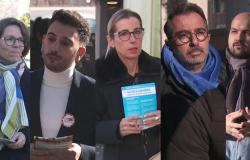The latest biography of the man who tried to unite the socialists emphasizes that his success as a politician and thinker is linked to his attachment to his native land of Tarn. It addresses themes such as the fight against anti-Semitism, parliamentary battles and the defense of the working world, which strongly resonate with current events.
The essentials of the day: our exclusive selection
Every day, our editorial team reserves the best regional news for you. A selection just for you, to stay in touch with your regions.
France Télévisions uses your email address to send you the newsletter “Today’s essentials: our exclusive selection”. You can unsubscribe at any time via the link at the bottom of this newsletter. Our privacy policy
Jean-Numa Ducange places from his introduction “the man of Carmaux”, as he calls him, in relation to his territory, “his little homeland”, “using Occitan when it is necessary to communicate with the inhabitants of his region. Whoever obtains the philosophy aggregation in third position behind Bergson will also choose to take their first teaching position in Albi.
He is certainly not a son of the people, but he is not the descendant of a great lineage. It’s a sort of in-between that gives him a glimpse of what the political and military elites look like… without being disconnected from the small provincial and peasant people that he also meets. His native land ultimately allows him to experience quite different realities.
And when he married, Jaurès took up residence with his wife at the Bessoulet estate in Villefranche-d’Albigeois, “his rear base, the place where he spends every summer and where he goes when he can”. The need for social reforms was not revealed to him by the Carmausin mines but by those of Decazeville. In January 1886, Jules Watrin, an engineer, was thrown out of the window by angry workers. “Jaurès will never be a supporter of the eradication of employers” comments Ducange.
Another mark of his regional attachment, the future boss of “l’Humanité” would join a year later as a journalist in a Toulouse and non-Parisian title, “La Dépêche”, definitively confirming his distance from “those who do not want to hear about the socialists and trade unionists. The journalist who goes down to the Carmaux mine “to find out” calls for deputies closer to the people and “democratic representation of work”.
Defeated in 1889, he moved to Toulouse to teach at the university. His course load not being too heavy, he was able to continue his political research and sharpen his already established reputation as a tribune. At the same time, he became deputy mayor of the city alongside his friend Camille Ournac.
His delegation concerns public education but when the labor exchange is inaugurated, several trade unionists ask the mayor that he also give a speech there. Already through his thesis “the intellectual bridges” that he wants to build between Germany and France are taking shape, twenty years after the Franco-Prussian conflict.
Another position which differs for its time, but which brings it even closer to its land: protectionism. He wants in particular to apply it to the Vignerons du Midi and thus undoubtedly rally to his panache the peasant voices which he lacked during previous legislative elections. And to complete this anchoring on these Tarn lands, Jean Numa Ducange affirms “Carmaux plays a big role in the “conversion” of the tribune to socialism”.
Jean-Baptiste Calvignac, a formerly persecuted worker, becomes mayor of the mining town. The president of the company which operates the site, Jérôme Ludovic de Solages is the outgoing deputy. The local baron will throw in the towel for this election but he will have other opportunities to confront Jaurès who will be elected in 1892. The convert to socialism who, throughout his life, will aim for unity, also ends up meeting Jules Guesdes in Toulouse. Toulouse where he would experience a symbolic victory a few years later at the socialist congress held in the Jacobins refectory room.
It is necessary to insist on the fact that “Toulouse 1908” constitutes, in socialist memory, a key moment. It would even be “at the source of the thought of democratic socialism as it was deployed in France for more than a century” declares Lionel Jospin, Socialist Prime Minister from 1997 to 2002.
His rural constituency of Carmausin and his voters often failed him. It was not easy to defend Dreyfus, the separation of powers between church and state, anti-colonialism or even Franco-German friendship. On the other hand, he was always there for the leftovers of Mazamet or the megissiers of Graulhet who even then had to fight against mechanization and a form of deindustrialization.
He visited the Pantheon several times during his life, surely not suspecting that he would be taken there 10 years after his assassination (the perpetrator of which was acquitted). A Pantheon whose walls he saw while he was studying at the Collège Sainte-Barbe and whose easier constituency was almost assigned to him when he was defamed and threatened in his own. Circumscription which he refused. “Perhaps he did not want to appear as a “traitor” to the inhabitants of his region,” writes Ducange.
A monument to the Great Men about which he also fought to get Émile Zola to access it. And around which the left continued to tear each other apart over its entry or not into this building of the nation. Many made the dead man speak. For some, he belonged to the communists and revolutionaries, not to the Republic. For still others “he would beg to be allowed to sleep in his land of Albi” or “he would have refused this honor”.
In retrospect, it is tempting to describe Jaurès’ final years as those leading to inexorable failure. But it is undeniable that, during his lifetime, the philosopher deputy did everything possible to avoid war with unusual energy and mobilization. This is above all what the historian must account for.
“He had accepted the most difficult duty of remaining wise in a country of enthusiasts,” Stefan Zweig said of him. Jean Jaurès, who defended peace until his last breath, was one of the rare members of his family not to have turned to a military career.
Even when he disappeared, the philosopher deputy also paid his own tribute on the battlefield. His son Louis, who had managed to get incorporated when he was not yet 18, died five months before the end of the First World War.
“Jean Jaurès” by Jean-Numa Ducange, Perrin biography






